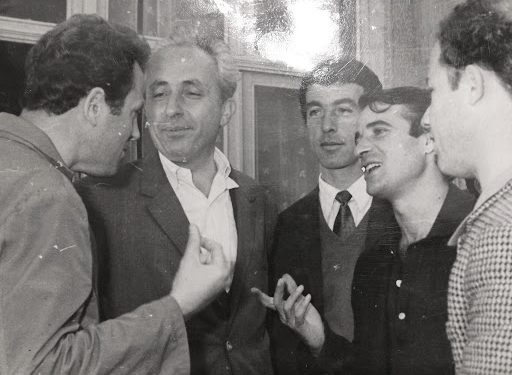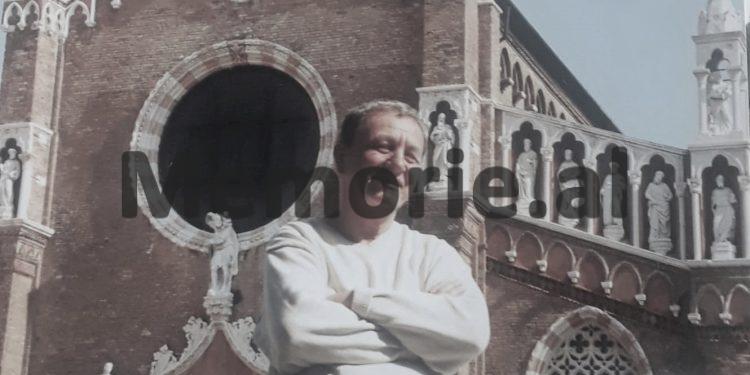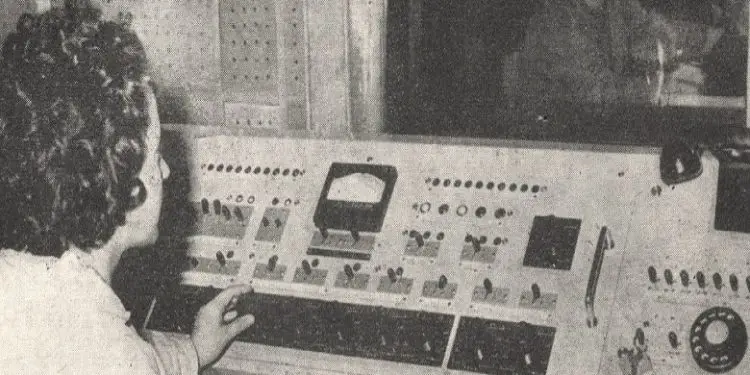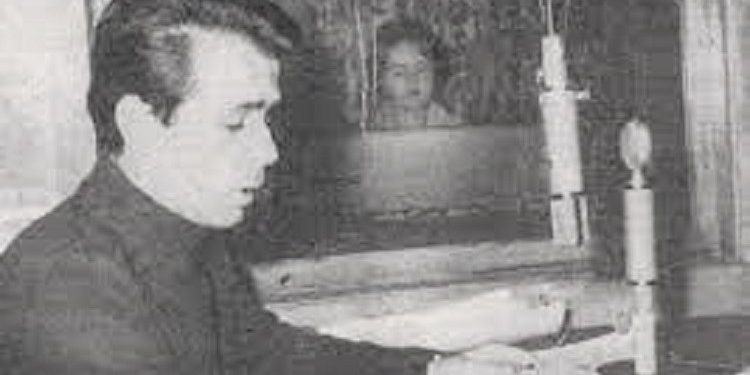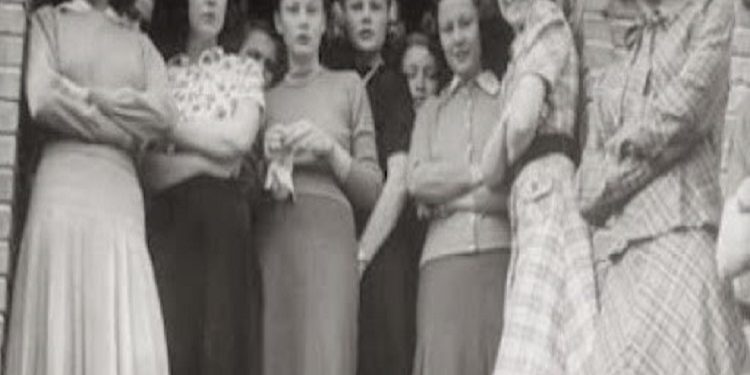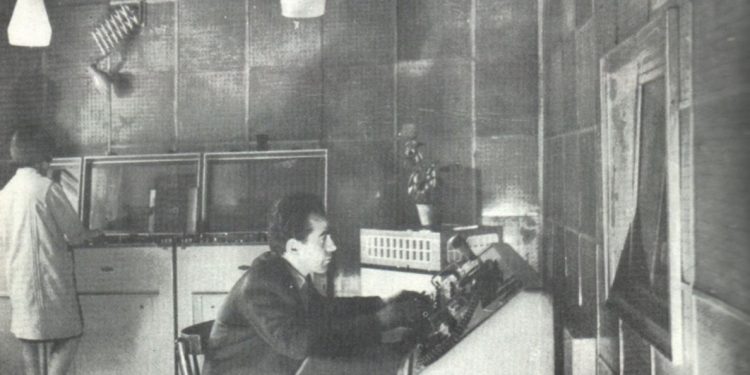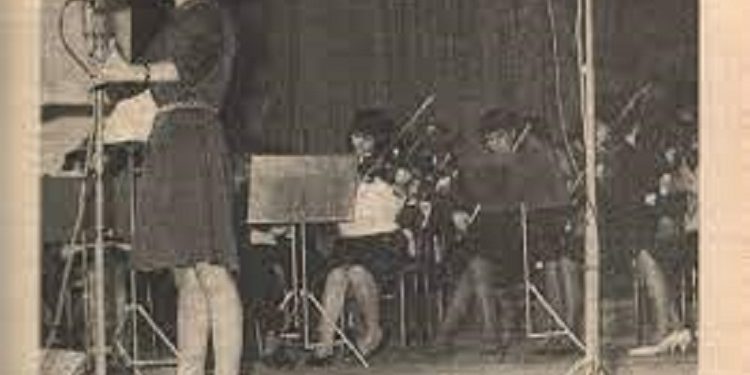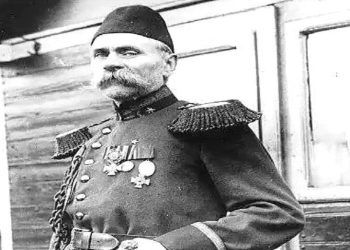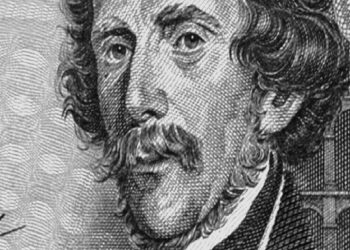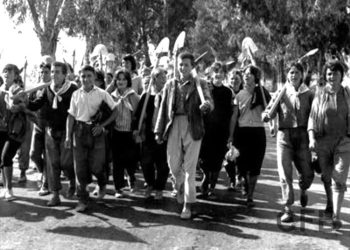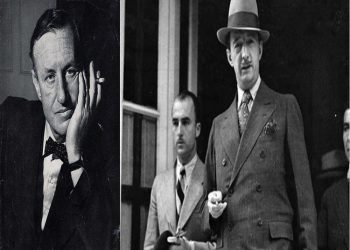By Bashkim Trenova
Part seventeen
Memorie.al publishes the memoirs of the well-known journalist, publicist, translator, researcher, writer, playwright and diplomat, Bashkim Trenova, who after graduating from the Faculty of History and Philology of the State University of Tirana, in 1966 was appointed a journalist at Radio- Tirana in its Foreign Directorate, where he worked until 1975, when he was appointed journalist and head of the foreign editorial office of the newspaper ‘Zeri i Popullit’, a body of the Central Committee of the ALP. In the years 1984-1990, he served as chairman of the Publishing Branch in the General Directorate of State Archives and after the first free elections in Albania, in March 1991, he was appointed to the newspaper ‘Rilindja Demokratike’, initially as deputy / editor-in-chief and then its editor-in-chief, until 1994, when he was appointed to the Ministry of Foreign Affairs with the position of Press Director and spokesperson of that ministry. In 1997, Trenova was appointed Ambassador of Albania to the Kingdom of Belgium and to the Grand Duchy of Luxembourg. Unknown memories of Mr. Trenova, starting from the war period, his childhood, college years, professional career as a journalist and researcher at Radio Tirana, the newspaper ‘People’s Voice’ and the Central State Archive, where he served until the fall of the communist regime of Enver Hoxha, a period of time when he in different circumstances met some of the ‘reactionary families’ and their suckling’s, whom he described with a rare skill in a memoir book published in 2012, entitled’ Enemies of the people ‘and now brings them to the readers of Memorie.al
Continued from the previous issue
“Enemies of the people”
Jarmilla, Vjesha, Marcela and Irena Kubati, the good and unfortunate translators of Radio Tirana!
I do not know the fate of the others, of Jarmilla who with her silence seemed to others somewhat strange, but who did not forget to thank me, always happy, when she found a rose in her typewriter. I heard that Irena Kubati, a wonderful woman, has left Albania and lives in a town on the Hungarian-Slovak border. For the shy and somewhat reserved autumn, I learned that she too has fled Albania and lives in Poland. For someone else, like Marcela, the hilarious Romanian translator, I have been told she is no longer alive.
For the other translators, I could not know where they are, how did their life go?! I know, however, that all of them were persecuted, persecuted, convicted, fired just because they were foreigners, simply because they loved Albanian boys, simply because they did not hesitate for a moment to leave their homeland, their parents, sisters and brothers, friends and comrades, everything precious and sacred, a better life and yet cheaper, simply because as faithful women they did not abandon their husbands in adversity because they wanted to protect their families. This human “crime” could never be forgiven by the demonic dictatorship of Enver Hoxha, who terrorized an entire nation for almost half a century. The dictatorship could not accept their very existence simply because it reminded Albanians that outside Albania there is another world, another “planet” from where they came from. This disturbed the architects of the country’s total isolation from the world, the experimenters of European Tibet.
Translators of non-Albanian origin, even when they were at work on the Radio, when they did not raise their heads from the typewriters, even to avoid an unfriendly look, maintained a discriminatory, insulting and isolating attitude. Formally and legally they were Albanian citizens and regular employees of Radio Tirana, appointed by the respective nomenclature, just like all the rest of us. They were practically not like the “others”. They were obliged, for example, to stay in their offices at a time when a collective meeting was taking place, regardless of the problem to be discussed. They were part of the collective, but were not called to the collective meeting! They had Albanian citizenship, but were not allowed even what was only formally allowed to Albanians.
I say formally because the meetings of the collective, in fact, did not solve any problem, had no decision-making or binding force. Everything was prepared elsewhere, placed elsewhere, at different levels of the party and state pyramid. The collective was needed only as a “democratic” decor. His meetings were an open mockery of the total lack of minimal democracy at work and in society. The team gathered for applause, but also to spot and shoot any casualties. The government did not need the applause of those who were destined to be the next victims, such as foreign women, translators of Radio Tirana. Albania was a giant Gulag where Albanians had the exclusive “right” to cheer for a happy life, for the Party and Comrade Enver. Others were also deprived of this “right.”
Kasemi, the Hungarian translator, who had come with Geraldine!
The departure of translators from Radio Tirana could not but create a serious problem regarding the continuity of Foreign Radio programs in foreign languages. It is known that the regime attached great importance to these shows. We have already talked about this. The gap created by a completely crazy policy, which did not spare even the necessary staff, which was part of the preparation of these shows, can be compared to the image of the woodcutter who axes the branch where he stands. Cutting the branch will knock down the woodcutter along with it. The dictatorship in Albania took place in this position after the departure of the Radio translators. The situation was even worse if we consider that some of the translators who would continue to work were elderly, retired or on the verge of retirement. Such was Kasëm Baçi, who helped translate the Hungarian show.
Kasemi, a short man with a sharp step, had come to Albania as an escort to the Hungarian countess Geraldina when she married King Zog I. This was also his “stain”. He had left Albania as a child. At the time of the First World War, the Austro-Hungarian troops, which had reached Albania, took with them many Albanian children to educate them. Among them was Kasem Malaj, otherwise Kasëm Baçi, as the Hungarian translators Irena and Magda were respectfully called, as well as Tomorr Dibra, who worked in those years as a translator and especially as an incomparable speaker of this show.
Albanian Radio Television was subordinated to the Council of Ministers. In order to have the situation under control, the Council of Ministers on May 20, 1977, sends a report to the General Directorate of the Albanian Radio and Television. In this report it is said that it is the order of the Prime Minister Mehmet Shehu, to prepare translators for several languages as soon as possible, even «to be perfected, to be sent as clerks at the embassies, which should increase the staff and there to be put in available teacher ». A system that is bureaucratized to the core “finds” the solution in the protocols. The destiny of man as an object and at the same time as the sole subject of work is negligible, non-existent.
The “purification” was felt after the IV Plenum of the Central Committee of the Party, not only on Foreign Radio and not only among foreign women married to Albanian men. The Music Editorial Office had to pay its tribute for the bourgeois-liberal deviations not only in the XI Song Festival on Radio-Television, but also in the structure of the music programs broadcast by Radio Tirana. According to the decisions that were taken in the higher instances of the Party and that were obligatory for Radio Tirana, in the design and broadcasting of music programs he had to own the music or the folk song accompanied by the patriotic-revolutionary one. Then, a part of the programs should be occupied by the cultivated Albanian music of the years of dictatorship, ie the anthems for the new life, for the Party and comrade Enver. In the end, an almost negligible space was left to what was called “foreign music”, but which was in fact classical, operatic music.
“Easy” foreign songs and music, contemporary melodic, completely ignored, had seemed a bit, too hesitant and shy, as an accident, only for a very short period of time on Radio Tirana shows.
The “accident” happened with the arrival of Todi Lubonja as general director of the Albanian Radio-Television. The “damages” he caused had to be paid not only by Todi Lubonja, but also by his “collaborators” in the Music Editorial Office. Throughout the history of the Albanian Labor Party, all the enemies condemned by the Party, have never acted alone, but in groups, with collaborators! This logic would continue even in the case of the major cleanups that took place on Radio Tirana in this period.
Dhurata Koshi of the Music editorial office, who suffered for the song “O blue mom”
As a collaborator of Todi Lubonja in the Music Editorial Office, Dhurata Koshi was “discovered”, who does not know if she had ever had the opportunity to say “Mirdita” and nothing more to him. I “knew” the gift before I started working at Radio Tirana. She was a cheerful girl, who stood out on the streets of Tirana, tall, thin, with her white hair tied in a ponytail. She also drew attention to the way she liked to dress and behave, contrary to what we were used to. In fact, Dhurata, when we met, had just returned from the German Democratic Republic, where he had been studying harps. She came along with hundreds of other Albanian students, who returned from the Soviet Union and Eastern European countries to Albania without finishing their studies. All were expelled after the Kremlin severed diplomatic relations with Albania.
Dhurata Koshi’s sin was that she was the editor of the Music Editorial Office at Radio Tirana and broadcast some foreign songs. I remember some French singers like: Georges Brasens, Serge Rexhiani, Sharl Aznavur, Mireij Matië, Edit Piaf, Leny Escudero, etc., who took place in the music programs of Radio Tirana. Renée Anderson provided their songs to Radio Tirana from her personal records. She, as I said before, worked together with her husband, Nils Anderson, for several years for the French show on Radio Tirana. Renée was a cheerful, lively woman. Before coming to Tirana she lived in Lausanne, Switzerland. She really liked French light music singers. From Switzerland he had brought with him many discs with songs performed by them. I was present when their disc-to-tape recording was done in the Radio studios. Everything was done in an orderly manner, with the congratulations of the hierarchical links, which had given their prior approval. The songs were broadcast over about two years and no one felt to say anything against, to stop the continuation of the broadcast.
After the return of Thanas Nano as the general director of the Albanian Radio Television, Dhurata left Radio Tirana. Thanas Nano, in an article published in the Party newspaper, “Voice of the People”, writing about the damage they have done to Todi Party propaganda and those who supported it, also mentions the broadcast of the famous song “Blue Mom”. This “sin” could not be forgiven or forgiven. She was transferred to Fushë-Krujë as a music teacher. In this town which you could visit in all its extremes within a few minutes, she quickly felt stressed, always with a health, which was constantly deteriorating. It seemed as if the youth were abandoning him mercilessly, prematurely. Albert Shala, who often met Dhurata at the time, told me that she “was a fragile, very fragile guy who did not believe that the waves of class warfare would hit him anywhere, without the ability to get up on foot. ”Maybe that says Albert, was the reason she talked and talked, thinking that someone could even hear her.” In fact no one would listen to the Gift. Even Berti, with whom she had known since the time they worked on the Radio, and who listened to him, as he himself says: “Except for a kind word, as a consolation, I could not do anything.” Bert himself was convicted, but no one else could do anything for him in a social system where innocence was arbitrarily equated with crime while real crime, state terrorism, was valued.
Dhurata stayed in Fushë-Krujë for years, without family, without any perspective, just because she wanted the Albanian youth to enjoy life, everything was beautiful, because she judged that real music knows no class, ideological or state borders, that it belongs to all, that no Berlin wall could stop it. If only George Brasens and Mirej Matië, Aznavur or Rezhiani, Celentano or Mina, Domenico Modunio or Milva, the Beatles or the Jeepsikings knew that their song also had its tragic victims! What an absurdity! Unique even as such. The gift was “stained” in the biography even before he was sentenced. In fact, the “stain” was on her sister Eglantina, and even her husband, Minush Jero.
Imprisonment of Minush Jeros and Mihallaq Luarasi for “Brown Stains”!
Minush Jero had written in 1968, the drama “Brown Spots”. At this year’s Albanian Professional Theater Festival, this drama won the Festival Flag and snatched all the awards, but its glory lasted only 24 hours. The dictator, unusually, sought to see the drama. At the end of the show he said he had seen not “Brown Stains” but “Black Stains”. “This show,” he said, “is a revisionist work and manifests the embodiment of liberalism in Albania.” The drama was isolated to never be shown again. In 1973 its author, Minush Jero, and director, Mihallaq Luarasi, would be arrested and sentenced, “in the name of the people,” to 8 years in prison each. They were accused that “alone and in cooperation with each other they agitated and propagated against the popular power, ie that they committed the crime provided for in paragraph I of Article 73 of the Criminal Code”, that their purpose was “to undermine or weaken” this power, that “they have consistently continued their criminal path”, that they have been “put in opposition to the Party line and have propagated against the various policies and measures taken by the Party for the revolutionization of country “.
In communist Albania, as in feudalism, criminalization and punishment were immediately transported from one person to the whole tribe, family or even friends. Dhurata Koshi’s conviction as a liberal took place in a pre-prepared field, favorable to its perpetrators. Dhurata herself blames the head of her editorial office, Liri Çelin, a short woman with a masculine step, who hid behind her dark glasses intelligence and evil, an always “principled” position, according to the waves and winds of the politics of the day.
The meeting with foreign tourists, which caused problems for me, Dhurata Koshi and Lili Tafaj!
I happened to be with Dhurata once by chance for a vacation at the same time in Hotel “Apollonia” in Durrës. I was with my Radio colleague, Shaban Murati. She was with her friend, Lili Tafaj, one of the best pianists of the Opera and Ballet Theater in Albania. In love with the song, Dhurata asked the rest of us to accompany her song. He then organized a “performers’ contest” of the song. At her insistence, one day I appeared in this “competition” with the Albanian folk song “I was only thinking”. The melody and lyrics of this love song are sad. The assessment of the “jury”, which consisted of Dhurata and Lili, was that I sang correctly and that I had “a dramatic voice”. In the Gift and Lily room, we were attending another “artistic spectacle”. Lily after wrapping herself in the bed sheet started and imitated Indian dances perfectly, as if she had grown up between them. So quickly passed two weeks laughing, soaking in the sun and cooling off in the Adriatic waters, drinking in the evening a glass of beer on the track of the “Railway”, which left the beach to lie a few tens of meters in depth of the sea.
On one of those few evenings, as the holidays were coming to an end, we had an unwelcome “meeting” and, I believe, the first such “meeting” for each of us. Unbeknownst to us, we became the target of state security agents, Soviet KGB civilians, or Romanian Securitate’s.
As usual, we were sitting around a table at the Railroad and drinking our glass of beer. At a nearby table came and sat some tourists, young people too, who caught our attention with their colorful dresses and flowers. At that time, any communication with foreigners who came to Albania, even if it was silent, even an exchange of glances, a slight passing and kind smile, all these were strictly forbidden for Albanians. We knew all this, yet our backs ate us up. The gift put on the table the challenge “dare or dare not talk” to our tourist neighbors!? This, at that time, meant neither less nor more whether we dare or dare not respect the “rules” set by the dictatorship! We, of course, did not think so. We thought simply to “try” ourselves, to enjoy a youthful whim. I proposed to talk to them, but to do so when we get up to leave, which would avoid a lengthy conversation between us. So we did. We did not last long. We learned that they were Swedes. We were not told that we are employees of Radio Tirana. We told them we were students. I offered them my pack of cigarettes and they gave me theirs. We greeted each other thinking that with our skill we had thrown it to the Security, but the truth was quite different. The Security Eye had been watching everything, thankfully excluding the exchange of cigarette packs. They would have it as a “fact”, which proved an exchange of messages!
As in the detective and horror movies, as we were returning to the Hotel in the semi-darkness of the beach, Shabani turns his head back and sees that two people were following in our footsteps. “Security,” said Shabani, adding that we should all have one word, that is, that it was the Swedes who spoke to us first, that they were the ones who asked us for a cigarette and we just offered them a cigarette, nothing more!
Insurance came up to the lobby of the Hotel. We showed them our version. Nor did they hear from this ear. Their question was: “With what mission did you come to Durrës”?! The answer that: our only “mission” was summer vacation, was lost in the desert of their brains. The next question was: “How do you explain that you all came together for vacation”? It was useless to talk, not even to make a sound. We were on a mission; we had to confirm this as soon as possible! Our interlocutors, State Security agents, seemed to me absurd, ignorant characters who did not know what to say and do, who abused their duty. With this feeling, I gave them a lecture to get acquainted with the sound biography of my family and ended up turning from accused to accuser. I said to them, if you doubt me, why should I not doubt you? Those words were gasoline on fire. Security agents were accustomed to be held as the most devoted people to the Party, as the faithful guardians of the homeland, the most trusted people, and so on and so forth.
Even after about 40 years, I have not forgotten this “meeting”, even its details, which I saved here so as not to linger too long with him. I remember that Dhurata told me that she loved brave people, as I had shown to the insurance companies. I myself was not aware that I had shown courage. It seemed to me like I was just playing the role that belonged to me in that scene, without even knowing that I was on stage, in a cruel scene, that treats people like a fatal character. I always knew myself concrete; I thought I was untouchable, when only the dictator in Albania was like that. Blindness, naivety and political ignorance!
The sad fate of Dhurata Koshi, who killed his youth!
I had the opportunity to see both insurance companies several times in Tirana. One roamed the city streets like a bastard hunting dog, looking for a host. The other was stuck in a kiosk on “Qemal Stafa” street, in front of the Polish embassy. He was playing the cigarette seller. I met Dhurata by chance in Tirana after the overthrow of communism. He was not alone. She introduced me to her husband, Kadri Spahia. I knew him since my childhood. I had seen him go and prepare the Propharma women’s choir, a pharmaceutical company where my sister, Engjëllushja, also worked. At the production center festivals, which took place, it seems to me, every year at that time, this choir, had often received the festival flag or was honored with first prizes. Kadri had a beautiful, straight and tall body and, as my sister confided to me, the daughters of Profarma were ready to die for him. In fact Profarma, almost in its entirety, the employees had girls and women; it was like an oasis of amazons. I had known Kadri as a singer, as well as his brother, Bajram Spahia, a well-known performer of the Shkodra folk song. He was thus from a family that loved music just like Dhurata, who seemed to me, at last, happy.
I had my last “meeting” with Dhurata in June 2000, when I read in the Albanian press an article by Ben Andon, entitled: “Dhurata, the story of the rare harp artist”. From the article, among other things, I learned that she had tried to stage her dream. She tried to play the harp with the Opera House Symphony Orchestra, but the years had passed; now it was too late. She could not even move the harp on stage by herself.
The gift was taken away from her youth, her dream was killed, she was not allowed to have a child (her marriage took place in old age), to enjoy grandchildren, to enjoy life like everyone who comes to this world also to enjoy it, to have his share of joy. She has not gone because she did not live the most beautiful part of her. I wish the present and the future to be her good friends. Memorie.al
The next issue follows





